|
|
|
Sort Order |
|
|
|
Items / Page
|
|
|
|
|
|
|
| Srl | Item |
| 1 |
ID:
127445
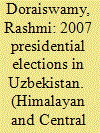

|
|
|
| 2 |
ID:
077140
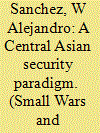

|
|
|
|
|
| Publication |
2007.
|
| Summary/Abstract |
The Islamic Movement of Uzbekistan (IMU) is a Central Asian terrorist organization that has carried out series of attacks in countries like Uzbekistan, Kyrgyzstan and Tajikistan for years. With the ultimate goal of creating a Central Asian Caliphate, the IMU, even in its current weak state, is a regional threat. A military solution to this problem appears to be the likely answer. Regional powers like the Russian Federation and China should be militarily involved in Uzbekistan, along with Uzbek and neighboring forces in order to defeat the IMU militarily. This will promote greater integration among these countries and eliminate a violent organization which could become a destabilizing factor if not dealt with.
|
|
|
|
|
|
|
|
|
|
|
|
|
|
|
|
| 3 |
ID:
072833
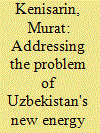

|
|
|
| 4 |
ID:
180306
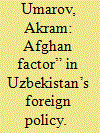

|
|
|
|
|
| Summary/Abstract |
This article examines the historical development of Uzbekistan's stance on the situation in Afghanistan, outlines its main stages, achievements and challenges, investigates the major initiatives of Tashkent on solving conflict in the neighbouring country before and after 2016, the major priorities of its contemporary foreign policy towards the Afghan conflict, and the Uzbek government's expectations from the upcoming developments in Afghanistan.
|
|
|
|
|
|
|
|
|
|
|
|
|
|
|
|
| 5 |
ID:
095160
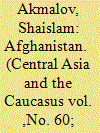

|
|
|
|
|
| Publication |
2009.
|
| Summary/Abstract |
For three decades now the country has been struggling for survival amid a never-ending armed conflict that makes a concerted foreign policy course impossible. This is fraught with a loss of statehood and is responsible for Afghanistan's role and place in the international relations system.
|
|
|
|
|
|
|
|
|
|
|
|
|
|
|
|
| 6 |
ID:
137329
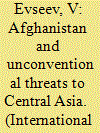

|
|
|
|
|
| Summary/Abstract |
THE STATES OF CENTRAL ASIA faced the Afghan problem practically right in the wake of the disintegration of the Soviet Union. It first showed in ideas of radical Islam trickling into them with the resumption of ties with Uzbek and Tajik relatives who lived in Afghanistan. Uzbekistan's President Islam Karimov managed to limit the negative impact of this process. Things, however, were totally different in Tajikistan where for the duration of civil war Afghanistan was in effect a hinterland base for the irreconcilable opposition.
|
|
|
|
|
|
|
|
|
|
|
|
|
|
|
|
| 7 |
ID:
128387
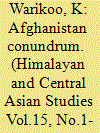

|
|
|
|
|
| Publication |
2011.
|
| Summary/Abstract |
Located at the crossroads of Central, South and West Asia and sharing. its borders with Central Asian Republics of Tajikistan, Uzbekistan and Turkmenistan on the north, Chinese province of Xinjiang in the east, [ran on the west and south west, and Pakistan and Pak-occu pied Kashmir on the south and south east, Afghanistan occupies a unique geo-strategic placement in the region. Distinct ethno-linguistic groups settled in different parts of .»'\fghanistan have diverse social moorings and political affiliations and aspirations. Th us the 'I'ajil
|
|
|
|
|
|
|
|
|
|
|
|
|
|
|
|
| 8 |
ID:
178469


|
|
|
|
|
| Summary/Abstract |
Uzbekistan and Kazakhstan have new leaders for the first time since 1989: Shavkat Mirziyoyev as Uzbek president and Kassym-Jomart Tokayev as Kazakh president. This article uses a theoretical framework based on the literatures of leadership change and political succession while overlaying this literature with the type of economic policies followed by each former leader to analyse the political and economic transitions in these countries. Mirziyoyev has legitimized his authority, even though he was not part of the elite, through reforms designed to help the people (as Karimov had envisioned in the ‘Uzbek way’). In contrast, Nazarbayev’s policies were centred around the state as a facilitator of economic development, a problem for citizens in an economic downturn. While Tokayev transitioned through a formal electoral process, his was a ‘managed’ designation, with the charismatic leader still in a formal position of power, leaving Tokayev without a separate base of legitimacy.
|
|
|
|
|
|
|
|
|
|
|
|
|
|
|
|
| 9 |
ID:
080402
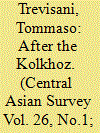

|
|
|
| 10 |
ID:
065884
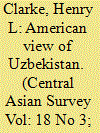

|
|
|
| 11 |
ID:
153010
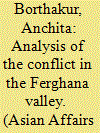

|
|
|
|
|
| Summary/Abstract |
The Ferghana valley which is an ethnically and culturally complex region divided among three Central Asian Republics of Kyrgyzstan, Tajikistan and Uzbekistan, witnessed a number of problems ranging from inter- ethnic tensions to border incursions; from security related complications to a number of socio- economic difficulties in the recent years. Moreover, it is also the most densely populated areas in Central Asia. Though sometimes the threat of religious extremism and intolerance in the Ferghana valley has been exaggerated yet it is difficult to completely deny their presence in the region and the obvious threat it has been posing for the entire Central Asia in future. The artificial delineation of border in the Ferghana valley which was finalized during the soviet era can be considered as one of the principle reasons behind the occurrences of various conflicts in the valley especially after the disintegration of the Soviet Union. Similarly, economy also plays a pivotal role in accentuating the conflict in the region as it is found that the root cause of majority of the conflicts prevalent in the region are regarding the domination of a particular ethnic group on the economic resources of that very area. However, the rivalry between the elites of the three republics and their struggle for power also play a prominent role in the disturbances that has been taking place in Ferghana valley as the elites of the valley do not want to lose their predominant position in the newly formed political establishments of their respective republics.
|
|
|
|
|
|
|
|
|
|
|
|
|
|
|
|
| 12 |
ID:
092708
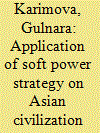

|
|
|
| 13 |
ID:
127642
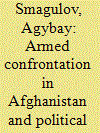

|
|
|
|
|
| Publication |
2013.
|
| Summary/Abstract |
The author looks at how the armed confrontation in Afghanistan affects the political and economic situation in Central Asia.
First, Afghanistan, which became a seat of international terrorism and religious extremism, as well as a foothold of the armed Tajik and Uzbek opposition in the 1990s, has developed into the real threat of a violent regime change in Tajikistan and Uzbekistan. In Tajikistan, the U.N. and certain other regional countries acting as intermediaries have successfully integrated the opposition into the country's peaceful development. The Uzbek opposition fighting on the side of the Taliban has been considerably weakened by the international counterterrorist coalition.
A compromise was reached in Tajikistan through constitutional amendments that legalized the Islamic party; on the other hand, we cannot rule out the possibility that in a country with a predominant Muslim population, Islam, a legal political factor, might come to power through democratic elections (this has already happened in Egypt).
The leaders of Uzbekistan chose a different road: instead of negotiations and compromises, they squeezed the armed opposition out of the country to Afghanistan. Operation Enduring Freedom practically reduced to naught the threats of extremist attacks very real in 1999 and 2000.
The coming pull-out of the international coalition troops from Afghanistan and inevitable bout of civil war that will ensue are causing concern in the Central Asian states: their far from simple social and economic context might raise a high wave of Islamic radicalism.
Second, instability in Afghanistan prevents diversification of foreign economic ties; it makes the construction of southward highways and railways, as well as power lines and gas pipelines, impossible. Afghanistan remains an insurmountable barrier on the trade route between the Central Asian countries and Kazakhstan, on the one hand, and the South Asian and Middle Eastern countries, on the other, and (which is even more important) blocks access to their sea ports.
The counterterrorist operation that began in 2001 failed: the United States is pulling out of the country leaving behind the same "Afghan threat," which is causing the Central Asian states to look to Russia and China as possible guarantors of their security.
|
|
|
|
|
|
|
|
|
|
|
|
|
|
|
|
| 14 |
ID:
149735
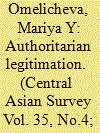

|
|
|
|
|
| Summary/Abstract |
What are the sources of authoritarian persistence in Central Asia? This study explores the argument that authoritarian regimes persist through effective authoritarian legitimation. Drawing on the theory and analysis of discourse, it develops an approach to authoritarian legitimation and examines discursive appeals to legitimacy by the Kazakh and Uzbek presidents. The study also assesses the effectiveness of the presidential discourses of legitimacy for public perception of the governing regimes in Kazakhstan and Uzbekistan. This research shows that by defining what constitutes legitimate power and presenting political rule as consistent with this definition, authoritarian governments can foster certain modes of reasoning and evaluation among citizens, and create possibilities for their acceptance of the regime as ‘right’ or ‘proper’.
|
|
|
|
|
|
|
|
|
|
|
|
|
|
|
|
| 15 |
ID:
080405
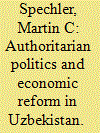

|
|
|
|
|
| Publication |
2007.
|
| Summary/Abstract |
All the ex-Soviet Central Asian states have super-presidential, authoritarian regimes with poor human rights records. Using the Universal Declaration of Human Rights, the article shows that Uzbekistan has sometimes improved, when the economy has been good, and has a mixed record on religious, labor, and language rights. All these states are sensitive to outside pressures if applied tactfully but try to maintain their independence from all outside powers
|
|
|
|
|
|
|
|
|
|
|
|
|
|
|
|
| 16 |
ID:
067356
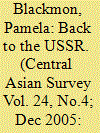

|
|
|
| 17 |
ID:
052703
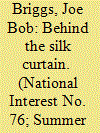

|
|
|
| 18 |
ID:
137229
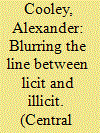

|
|
|
|
|
| Summary/Abstract |
The anti-corruption norm in both scholarship and the policy world has too narrowly focused on the domestic and institutional context of bribe-taking and public corruption. Instead, we argue that corruption in the contemporary global economy requires a multiple set of connected transactions, processes, and relationships that take place within informal transnational networks that blur the line between illegal and legal activities. These networks include multinational companies, elites in host countries, offshore financial vehicles and conduits, middlemen and brokers, and destination financial institutions. We examine how these actors operate in Central Asia, a region that is widely identified as corrupt, yet is rarely understood as embedded in the types of global processes, offshore connections and transnational links specified in our analysis. Examples of offshore centers in tax planning from Central Asia, and partial results from a field experiment based on impersonating high corruption risks from four Central Asian states, provide evidence for how the various actors in transnational financial networks structure their dealings. We then present two brief illustrative cases of how these transnational networks have operated in energy explorations services in Kazakhstan and telecommunications contracts in Uzbekistan. Our findings have theoretical, practical, and normative implications for scholars and practitioners of Central Asian international political economy and other ‘high risk' regions.
|
|
|
|
|
|
|
|
|
|
|
|
|
|
|
|
| 19 |
ID:
106147
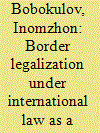

|
|
|
| 20 |
ID:
092006
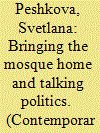

|
|
|
|
|
| Publication |
2009.
|
| Summary/Abstract |
In this article I argue that domestic space has to theorized as an important center of religious practice and socio-political activism. Born-again and devout Muslim women in the Ferghana Valley (Uzbekistan) use domestic space as an important sacred place for religious abservance and socialization equal to the mosques. This sacred place has a special meaning for born-again and devout Muslim as it carries a promise of personal and social change. In the context of religious and political persecution by the Uzbek state, domestic space is experienced as a politically safe place and as a critically important site of socio-political criticism and activism, as some intimate in-house discussions about religious, political, and social oppression take a form of public protest on the streets.
|
|
|
|
|
|
|
|
|
|
|
|
|
|
|
|
|
|
|
|
|